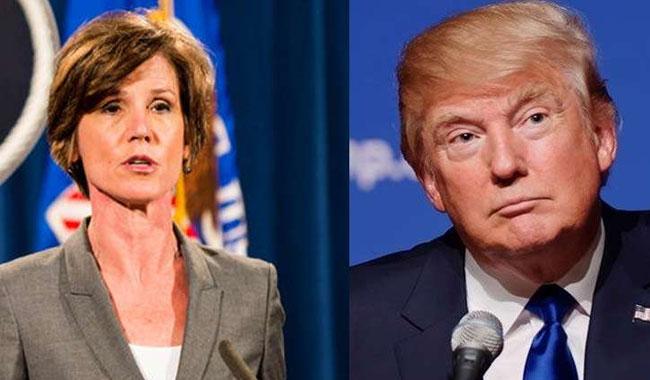 WASHINGTON: U.S. President Donald Trump fired the federal government's top lawyer Sally Yates on Monday after she took the extraordinarily rare step of defying the White House and refused to defend new travel restrictions targeting seven Muslim-majority nations.
WASHINGTON: U.S. President Donald Trump fired the federal government's top lawyer Sally Yates on Monday after she took the extraordinarily rare step of defying the White House and refused to defend new travel restrictions targeting seven Muslim-majority nations.
Yates said late on Monday that the Justice Department would not defend in court Trump's directive that put a 120-day hold on allowing refugees into the country, an indefinite ban on refugees from Syria and a 90-day bar on citizens from Iran, Iraq, Libya, Somalia, Sudan, Syria and Yemen.
Yates said she did not believe defending the order would be "consistent with this institution's solemn obligation to always seek justice and stand for what is right."
Hours later, she was fired. The White House said Yates "has betrayed the Department of Justice by refusing to enforce a legal order designed to protect the citizens of the United States" and portrayed her actions as political.
Trump has argued tougher vetting of immigrants is needed to protect America from terror attacks but critics complain that his order unfairly singles out Muslims and defiles America's historic reputation as a welcoming place for immigrants.
Yates, an appointee of former Democratic President Barack Obama, was days away from being replaced by Trump's pick for the top spot at the Justice Department, Republican Senator Jeff Sessions, who is awaiting Senate confirmation.
"Ms. Yates is an Obama Administration appointee who is weak on borders and very weak on illegal immigration," the White House said in a statement.
The White House said that Dana Boente, U.S. Attorney for the Eastern District of Virginia, would be acting U.S. attorney general until Sessions is approved.
Boente said in an interview with the Washington Post that he would enforce the immigration order.
There have been only a handful of instances in U.S. history of top Justice Department officials publicly breaking with the White House.
The most famous example was in 1973, when then-Attorney General Elliot Richardson and his deputy resigned rather than obey President Richard Nixon’s order to fire a special prosecutor investigating the Watergate scandal.
The incident, which became known as the 'Saturday Night Massacre,' was a public relations disaster and is seen as a turning point in Nixon's administration.

Post a Comment